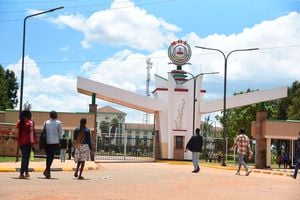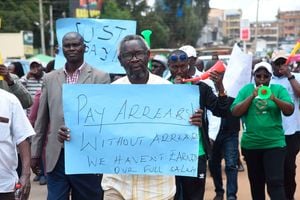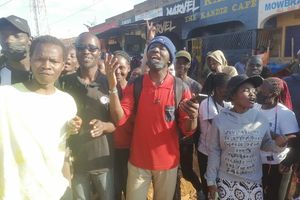
The entrance to Moi University's main campus in Kesses, Uasin Gishu County on February 8, 2024.
The crisis rocking financially troubled Moi University has persisted after the Senate failed to unlock the stalemate between staff and management over Sh10 billion pay arrears.
The Universities Academic Staff Union (Uasu) and the Kenya University Staff Union (Kusu) have rejected the proposal by the Senate to reopen the institution on November 4 and demanded payment of salary and other deductions amounting to over Sh10 billion.
“We have nothing to do with the proposed reopening of the university since we were not involved in the talks resulting in the resolution. All that we know is that the strike is still on until the management fulfills our demands on full payment of salary and other statutory deductions,” said Nyabuta Ojuki, Uasu Chapter Secretary.
The sentiments are echoed by Kusu which has protested against delayed salaries, non-remittance of bank loans, pensions, and other third-party deductions.
“As far as we know, there is no resolution on the reopening of the institution before the salaries and other deductions are paid in full,” said Bob Odhiambo Ng’ura the Kusu, Moi University Branch Chairman.
The university management has put on a brave face to save the institution from total collapse, refuting claims circulating in the media and social platforms on plans to transfer students to other universities over the deepening financial crisis.
“We want to assure our community, including students and parents that these claims are entirely unfounded and do not reflect the university’s intentions or actions,” said Prof Kosgey in a memo circulating in the social media.
He termed the notice being circulated in social media and purportedly signed by Deputy Vice-Chancellor Prof I.N. Kimengi on the transfer of the students as fake.
This comes as it emerges that the Senate is yet to set the date for reopening of the institution due to delays by the national treasury to release funds to cushion it from further administrative and financial crises.
The university has in the past admitted that it is in the red and the debt has accrued to more than Sh5 billion despite embarking on income-generating activities to raise funds to sustain its operations.
The worker’s unions have termed an insult the recent notice by the management to pay them part of the pending salaries and arrears.
They instead asked their members to escalate the strike to press the management to settle the salary and arrears in full.
“We have not been paid salaries for over three months and we will do nothing even if the university is reopened,” said Mr Ojuki.
The university council has planned to reopen the institution on November 4 after it was closed last month due to what the VC attributed to students’ unrest following a strike by the workers.
The national treasury has committed to release Sh2.9 billion to salvage the financially troubled university.
According to the National Assembly’s Committee on Education, the national treasury released Sh609 million last month to support the university meet its financial obligations.
The committee Chairman Julius Melly said the treasury is to release an additional 500 million this month to help stabilize operations at the university.
Among financial irregularities under probe at the university include failure to remit Sh4 billion in payroll deductions, defaulted on a Sh3 billion loan owed to Rivatex East Africa Limited, and accumulated Sh1.1 billion in unpaid bills as of June 2020.
Cabinet Secretary for Education Julius Ogamba has confirmed that the university was grappling with significant financial issues, including certified outstanding debts of Sh8 billion.
Parliamentary Public Investments Committee on Education has petitioned Auditor General Nancy Gathungu to conduct a forensic audit of the university’s books of accounts.
The committee chaired by Bumula MP Jack Wamboka has further recommended the suspension of all projects at the university and the hiring of new staff until the audit is concluded.
“I direct that the Auditor-General conducts a holistic forensic audit on Moi University covering the last five financial years and table its findings in 60 days,” directed Mr Wamboka when the University Vice Chancellor Prof Isaac Kosgey appeared before the team last month.
Among financial irregularities under probe at the university is its failure to remit Sh4 billion in payroll deductions, defaulted on a Sh3 billion loan owed to Rivatex East Africa Limited, and accumulated Sh1.1 billion in unpaid bills as of June 2020.
Learning was suspended and the university closed last month, with Prof Kosgey citing the unrelenting industrial action by teaching and non-teaching staff.
The university workers are accusing the management of failure to meet its basic financial obligations and staff welfare matters, among other challenges that have paralyzed smooth operations at the institution.











